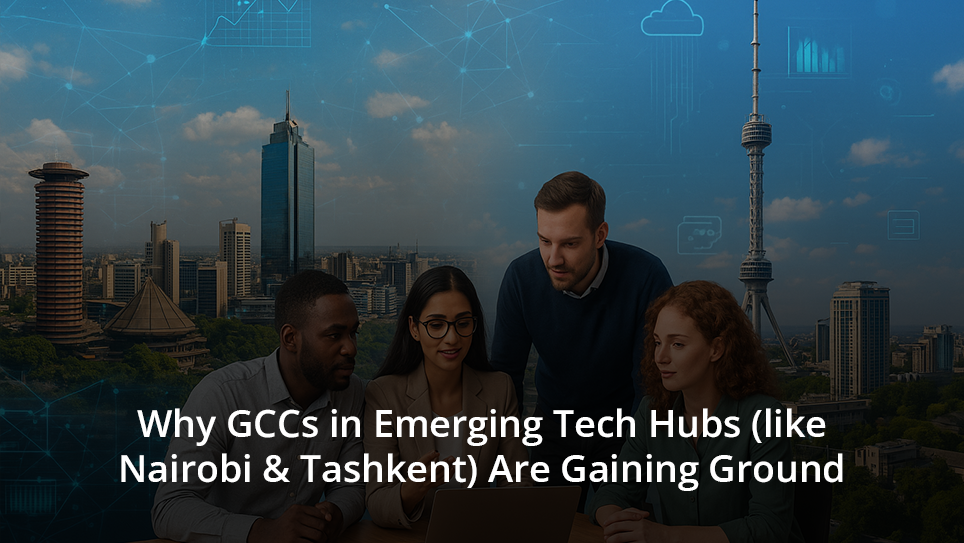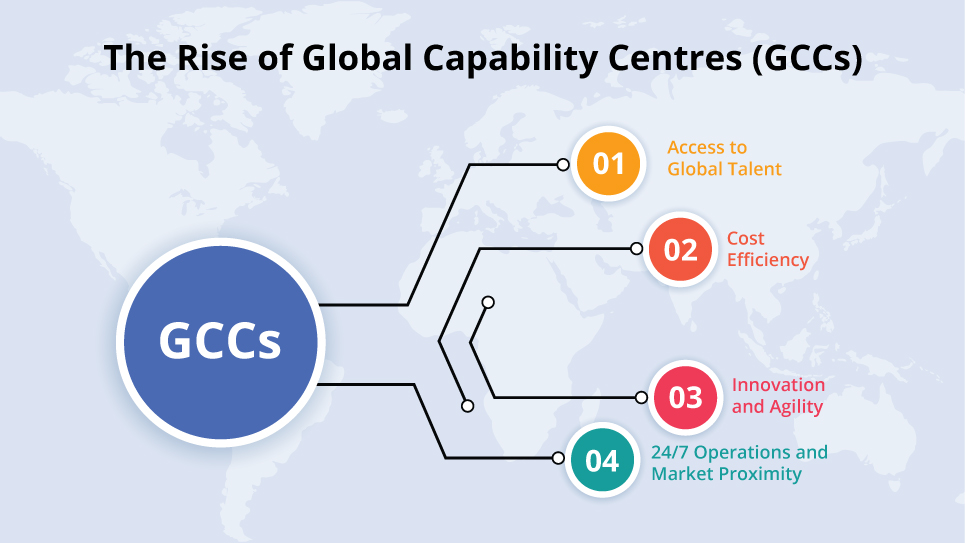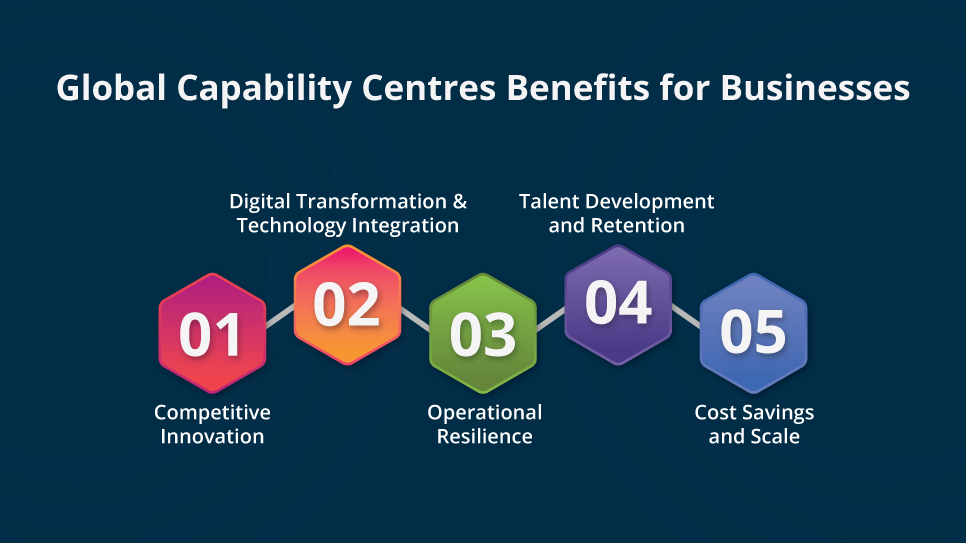Why GCCs in Emerging Tech Hubs (like Nairobi & Tashkent) Are Gaining Ground

Global Capability Centres (GCCs), also known as Global In-house Centres (GICs) or captive centers, have become a strategic asset for enterprises worldwide. In recent years, we’ve seen a surge of companies establishing GCCs in emerging tech hubs across the globe. Locations like Nairobi in Kenya and Tashkent in Uzbekistan, once off the usual radar for tech operations, are now gaining ground as attractive destinations for these centers.
This trend is driven by a combination of talent availability, cost benefits, supportive ecosystems, and the imperative to embed advanced technology in business operations. In this comprehensive blog, we’ll explore why GCCs are thriving in emerging tech hubs, the benefits they offer, real-life examples from Nairobi and Tashkent, and how FX31 Labs can help businesses leverage this movement.
Understanding Emerging Tech Hubs
Emerging tech hubs are cities or regions rapidly developing vibrant technology ecosystems, often outside the traditional tech epicenters. These hubs boast a growing pool of skilled tech talent, startup networks, innovation labs, and often government-backed initiatives to foster digital growth. Nairobi and Tashkent are prime examples of such hubs on different continents:
- Nairobi, Kenya – Dubbed “Silicon Savannah,” Nairobi has evolved into a leading African tech hub. It’s home to hundreds of startups and innovation spaces like iHub and NaiLab. The city’s tech ecosystem has attracted global giants (Google, Microsoft, IBM, Visa, etc.) to set up regional offices and R&D centers, drawn by the emerging tech hub’s talent pool and market potential. Strong government support (tax breaks for startups, ICT initiatives) and a track record of innovations like M-PESA mobile money have bolstered Nairobi’s reputation as an emerging technology hub.
- Tashkent, Uzbekistan – The capital of Uzbekistan is a rising Central Asian tech hub. Backed by initiatives like IT Park Uzbekistan, Tashkent is rapidly building a tech ecosystem with startup incubators and training programs. From January to May 2025 alone, Uzbekistan welcomed 636 new tech companies as IT Park residents (369 in Tashkent), underscoring its emergence as a “global IT hub.”. The government’s digital transformation drive and favorable business climate are positioning Tashkent as an emerging tech hub for international investors.
These emerging tech hubs offer fertile ground for innovation and expansion. They combine young, tech-savvy populations with improving infrastructure and supportive policies, making them ideal for companies seeking new frontiers.
The Rise of Global Capability Centres (GCCs)

Global Capability Centres (GCCs) are centralized units (often wholly-owned subsidiaries) that companies establish to handle critical business and technology functions from strategic locations worldwide. Originally, GCCs (or GICs) were set up primarily for cost-saving purposes and back-office support. However, today’s GCCs have evolved far beyond basic outsourcing. This shift aligns with the strategic benefits GCCs offer:
- Access to Global Talent: A primary driver for GCCs is the ability to tap talent pools worldwide. GCCs let enterprises leverage skilled developers, engineers, and domain experts in regions known for specific expertise. For example, India became famous for its IT talent, and now Kenya produces top-notch mobile and fintech developers, while Uzbekistan is cultivating a strong base of IT and data science professionals.
- Cost Efficiency: Cost arbitrage remains a key factor. Emerging tech hubs often offer lower operational costs, from salaries to office space, compared to major Western cities. GCCs in these locations allow businesses to optimize costs without compromising quality. The focus is on cost-efficiency rather than just cost-cutting; companies can reinvest savings into innovation.
- Innovation and Agility: Modern GCCs are built as innovation engines. Placing a centre in a vibrant tech hub can spur creative thinking and agility. These centres operate in a start-up-like environment, encouraging experimentation and rapid prototyping of new ideas. Often, GCC teams work on cutting-edge projects, e.g., AI development, fintech products, or IoT solutions, that inject innovation back into the parent company.
- 24/7 Operations and Market Proximity: Having GCCs spread globally gives companies near round-the-clock productivity across time zones. A GCC in an emerging hub can handle regional tasks and ensure there’s always a team awake somewhere working on critical projects. Additionally, locating in these hubs provides proximity to emerging markets. For example, a GCC in Nairobi can help a company tailor products for the African market and understand local user needs.
In essence, GCCs allow enterprises to embed advanced technology in business processes worldwide while enjoying the dual advantages of global talent and local insights. The benefits of Global Capability Centres have made them a cornerstone of modern business strategy: they drive innovation, increase operational efficiency, and act as gateways to new markets.
Why GCCs are Gaining Ground in Emerging Tech Hubs
Given the above advantages, why specifically are emerging tech hubs like Nairobi and Tashkent attracting GCCs? Several factors unique to these locations explain the trend:
- Growing Skilled Workforce: Emerging hubs boast a young, educated workforce eager to work in tech. Nairobi, for instance, has a tech-savvy talent pool nurtured by strong universities and coding bootcamps. Uzbekistan has heavily invested in IT education, producing developers and engineers fluent in multiple languages and frameworks. This abundance of skilled talent makes it feasible for multinationals to staff a GCC with high-caliber employees locally.
- Strong Government Support and Incentives: One reason Nairobi is an African leader is proactive government support, from tax incentives for tech companies to investment in infrastructure. Kenya even launched initiatives like Konza Technopolis (a planned smart city) to bolster its tech industry. Similarly, Uzbekistan’s government created an IT Park with tax benefits and legal frameworks to attract IT companies.
- Thriving Innovation Ecosystem: GCCs flourish in environments where innovation is happening. Emerging tech hubs often have dynamic startup scenes, co-working spaces, hackathons, and innovation labs. Nairobi’s ecosystem includes famous incubators (like iHub) and has yielded success stories in fintech, agritech, and more. Tashkent’s ecosystem is newer but rapidly expanding with help from global programs.
- Market Expansion and Localization: Placing GCCs in emerging hubs is often part of a broader market expansion strategy. Africa’s digital economy is growing fast, Google noted that by 2030, Africa will have 800 million internet users and a third of the world’s youth population. That represents massive market potential. It’s no coincidence Google chose Nairobi for its first African product development center, hiring local engineers to build products for African users. A GCC in such a hub allows companies to design and adapt products for local or regional needs.
- Cost and Quality Balance: Emerging tech hubs often strike an attractive balance between cost and quality. Real estate, wages, and operational costs are lower than in Silicon Valley or London, yet the quality of work and infrastructure is rising year by year. Many of these hubs have good internet connectivity (Kenya’s broadband improved greatly after undersea fiber-optic cables were installed) and modern office spaces. Companies find they can run a high-quality operation in these locations at a fraction of the cost, improving their bottom line
In summary, GCCs are gaining ground in emerging tech hubs because these locations offer exactly what modern global businesses are seeking: talent, innovation, cost efficiency, and growth opportunity. Nairobi and Tashkent exemplify how non-traditional tech cities can become pivotal parts of a multinational’s strategy, hosting GCCs that deliver core business and technology value.
Global Capability Centres Benefits for Businesses

Establishing a GCC in an emerging tech hub can yield significant benefits for a company’s business and technology strategy. Some of the key Global Capability Centres benefits include:
- Competitive Innovation: GCCs act as innovation hubs for enterprises. By leveraging local creativity and specialized skills, companies can accelerate product development and experiment with new technologies. This keeps the business competitive, as the GCC continuously injects fresh ideas and solutions that might not emerge from the headquarters alone.
- Digital Transformation & Technology Integration: GCC teams often spearhead digital transformation initiatives. They pilot cutting-edge technologies, such as AI, machine learning, and automation, and integrate these technologies into business processes. The result is a more technologically adept organization.
- Operational Resilience: Diversifying operations globally via GCCs adds resilience to the business. Different centers can handle various functions (from software development to customer support), providing backup and flexibility. If one region faces disruptions, work can shift to another GCC.
- Talent Development and Retention: A GCC in an emerging hub not only accesses talent but also helps develop it. Many GCCs set up training academies or partnerships with local universities, uplifting the skill level. For the enterprise, this means a steady pipeline of trained professionals who understand the company’s culture and systems.
- Cost Savings and Scale: Lastly, the cost advantage cannot be ignored. With controlled expenses, companies can scale operations faster. Savings from a GCC can be redirected to strategic projects or R&D. Over time, a well-run GCC can deliver high ROI, providing world-class work at a fraction of the cost if the same work were done in high-cost cities.
In essence, a GCC in an emerging tech hub offers the dual benefit of global reach and local expertise. It’s a way for businesses to stay agile and innovative by tapping into what the world has to offer. However, realizing these benefits requires the right strategy and partnerships, which is where expert guidance can make all the difference.
How FX31 Labs Can Help in Emerging Tech Hubs
Establishing and running a successful GCC or tech operation in an emerging hub can be challenging. It involves understanding local dynamics, hiring the right talent, and building robust technical solutions remotely. This is where FX31 Labs comes in. FX31 Labs is a technology innovation partner with deep expertise in global software development and digital consulting. We specialize in helping companies set up and scale their tech capabilities, whether through a Global Capability Centre, a dedicated development team, or project-based delivery, in locations around the world.
At FX31 Labs, we offer end-to-end support that covers everything from strategy to execution. Our services include custom enterprise application development tailored to your business needs, ensuring your GCC teams have the software tools and platforms required to excel. As a leading MVP development agency, we can rapidly prototype and build minimum viable products to kickstart your initiatives in the new hub. We also provide specialized AI prototyping services to explore and validate cutting-edge solutions before full-scale implementation.
Why choose FX31 Labs?
We have a track record of working with both startups and enterprises in diverse regions, giving us insight into the cultural and operational nuances of emerging markets. Our approach is collaborative; we don’t just build software, we share knowledge on best practices for managing distributed teams, implementing technology in business workflows, and nurturing an innovation culture within your GCC. When you partner with FX31 Labs, you gain a trusted ally that is committed to your global success.
FAQs
Q1. What is a Global Capability Centre (GCC)?
A1. A Global Capability Centre is a centralized offshore or nearshore facility owned by a company to carry out critical business functions. These centers (also known as GICs or captive centers) handle tasks like software development, IT support, R&D, analytics, and more, serving as an extended arm of the headquarters.
Q2. Why are companies setting up GCCs in emerging tech hubs?
A2. Companies are drawn to emerging tech hubs (like Nairobi, Tashkent, etc.) for their GCCs due to the rich talent pools, cost efficiencies, and vibrant innovation ecosystems these locations offer. Such hubs provide skilled engineers and innovators, often at lower operating costs, allowing GCCs to deliver high-quality work cost-effectively.
Q3. What benefits do Global Capability Centres provide to a business?
A3. Global Capability Centres’ benefits include increased innovation capacity, access to diverse expertise, and faster digital transformation for the company. GCCs drive technology in business by piloting new tools (AI, cloud, etc.) and spreading best practices across the organization.
Q4. How do Nairobi and Tashkent exemplify the GCC trend?
A4. Nairobi and Tashkent illustrate how emerging tech hubs are becoming integral to global operations. Nairobi hosts GCCs and innovation centers for firms like Microsoft, Google, and Visa, thanks to its strong tech community and infrastructure improvements. Tashkent, through initiatives like IT Park, has attracted hundreds of foreign tech companies, essentially functioning as mini-GCCs delivering IT services worldwide.
Q5. How can FX31 Labs assist in launching a GCC or tech project in an emerging hub?
A5. FX31 Labs can be your strategic partner in navigating the journey of setting up a GCC or any tech venture in an emerging market. We provide consulting on location strategy, help recruit and train local talent, and deliver development services (e.g., building software, MVPs, AI prototypes) to jump-start your operations.
Interested in leveraging an emerging tech hub for your next Global Capability Centre or innovation project? Contact FX31 Labs today to discover how we can help you accelerate setup, reduce risks, and innovate faster with our global development expertise. Let us help you turn an emerging hub into your next engine of growth.
